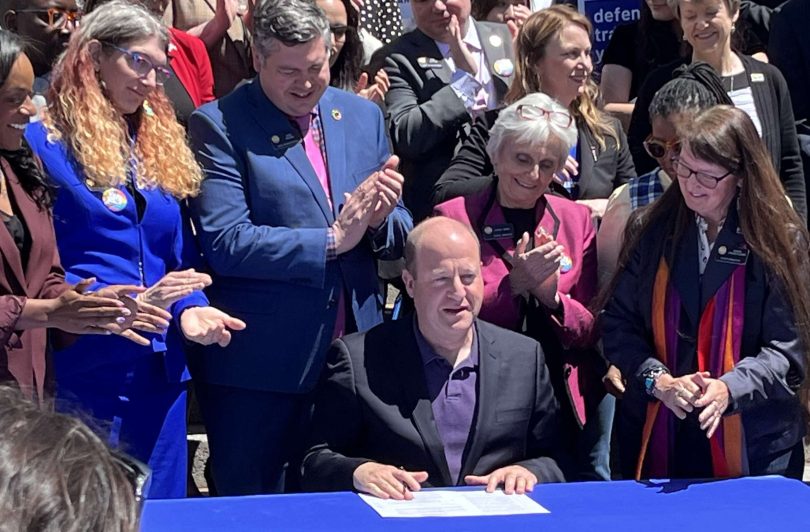This week marked a long-awaited victory for Colorado’s LGBTQ community: as the 2024 legislative session wrapped up, legislators approved a resolution that will give voters a chance to strike anti-same-sex marriage language from the state constitution.
On the last day of the session, legislators and advocates gathered at the west steps of the capitol building as Governor Jared Polis prepared to give the resolution his signature.
“Today is a great day for Colorado. The legislature has done their work, and now it’s up to Colorado voters to remove the ban on same sex marriage from our constitution in November,” said Nadine Bridges, Executive Director of One Colorado. “Colorado voters overwhelmingly support the freedom to marry for LGBTQ+ people, and now you will have the opportunity to show solidarity at the ballot box.”
Same-sex marriage has been a turbulent political subject across the U.S., but that’s especially true for Colorado. Amendment 2, a 1992 initiative, pushed largely by religious right groups like Focus on the Family, successfully banned anti-discrimination policies for LGBTQ people. Though it was struck down by the U.S. Supreme Court, it was followed by Amendment 43 in 2006, which amended the state constitution to only recognize heterosexual marriages.
“We have come lightyears in acceptance of same-sex marriage in the last decade,” said state Sen. Joann Ginal (D-Fort Collins), who sponsored the resolution in the state Senate. “The majority of Americans publicly support same-sex marriage — which wasn’t the case a decade ago. Growing up myself in the 60s, being gay was not a popular thing.”
Joining the Colorado legislature in 2013, Ginal recounted the victory of civil unions in Colorado during that year’s session. While civil unions did not grant same-sex couples legal recognition on the same level as marriage, it was for many a step in the right direction.
State Sen. Sonya Jaquez Lewis (D-Lafayette) recalled, “We were so happy [when civil unions became law] because we were partially legitimate. We were partially legal. You know, at least I wouldn’t have to worry that if Allison [her now-wife] was in the hospital. Well, we could be at each other’s side.”
Amendment 43 was effectively overridden by the U.S. Supreme Court’s ruling in Obergefell v. Hodges in 2015, allowing same-sex couples to legally marry nationwide. Many of those who spoke at the Capitol recounted the sheer joy they and others felt when the ruling was announced.
“I was serving in Congress when Obergefell was decided,” Polis said. “So I was at the steps of the Supreme Court that morning, along with, you know, a few thousand of my closest friends. Not knowing for sure what the decision will be, of course. And also not knowing for sure if that was the day was going to come down, was rumored to come down that day. We were there waiting, in the morning. And when it came down, just this feeling of pure joy erupted in the crowd, knowing that our right to marry has been protected by the Supreme Court.”
State Rep. Brianna Titone (D-Arvada) did not have her own story to share but recounted her wife’s joy at the decision. “When my wife found out – this was before we met – she was coming home from a trip in Canada, and she was waiting in the airport when the Obergefell decision came down,” Titone said. “And it was in the news on the TV. And she was so moved that this was a possibility for her, that she went into tears, sobbing, tears in the middle of the airport.”
But following the fall of Roe v. Wade in 2022, multiple Supreme Court justices, including Clarence Thomas, have indicated that they are open to reconsidering Obergefell. If that happened, Amendment 43 would go back into effect. The resolution aims to remove Amendment 43 from the state constitution before that can happen.
“This is what the people really want,” said Titone. “They don’t want an unconstitutional amendment in the Constitution anymore. You just proved it by having two-thirds of the House and the Senate allow the voters to choose. This is something we need to do now.”
Some Republicans have continued to oppose LGBTQ rights. One prominent example is state Rep. Scott Bottoms (R-Colorado Springs); during the resolution’s hearing on the state House floor, Bottoms added to his long history of inflammatory anti-LGBTQ statements by comparing same-sex marriage to a person marrying a tree or a goat.
Despite opposition from Bottoms and his fellow hardliners, the resolution passed in both the House and Senate with multiple Republicans voting in support, allowing it to reach the necessary two-thirds threshold to pass.
“It is a little strange and awkward to have to have, you know, my marriage, Senator Jaquez Lewis’s marriage, on the ballot for others to decide,” said Polis. “It doesn’t seem like something they should be deciding. But I’m hoping that my fellow Coloradans will make the right decision, and ensure that whatever happens at the national level, whatever happens at the U.S. Supreme Court, we will continue to protect the right to marry who you love here in the state of Colorado.”
Ginal, whose term ends next year, mused on the long journey of her political career, from helping pass civil unions in 2013 to the current moment.
“I know I have come full circle from beginning to end of my career in the legislature. This is a beautiful way to leave this Capitol,” she said.







